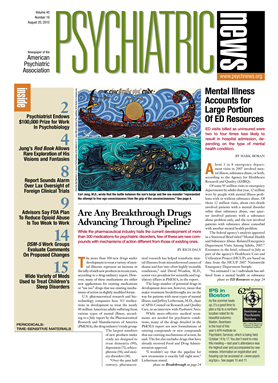Children with psychiatric and neurodevelopmental disorders often resist bedtime and have trouble falling asleep and staying asleep, said Judith Owens, M.D., an associate professor of pediatrics at Brown University's Alpert Medical School, who led a survey team studying prescription practices for children with sleep problems.
Resulting daytime sleepiness and fatigue may undermine children's school performance and disrupt family life, said Owens, who directs the pediatric sleep disorders clinic and the learning, attention, and behavior clinic at Hasbro Children's Hospital in Providence, R.I. Poor sleep also may exacerbate primary psychiatric disorders.
Child psychiatrists most often prescribe sleep medication to mitigate negative effects of sleep disruption on daytime functioning, Owens and colleagues reported in the August Sleep Medicine.
The researchers mailed an eight-page survey to the nearly 6,100 listed members of the American Academy of Child and Adolescent Psychiatry in 2003 to assess their use patterns of prescription and over-the-counter medications to aid sleep and their attitudes toward treating sleep problems with medication. They received 1,273 usable replies, a 27 percent participation rate, comparable to that of similar physician surveys.
Despite the time lag to publication, this survey is the only nationwide study of U.S. child psychiatrists' use of pharmacotherapy for children with difficulty sleeping, Owens said.
Slightly more men than women replied to the survey; most respondents were aged 49 or younger. Only 21 percent practiced in university-affiliated settings. The rest had clinical practices in the community, seeing a median of 70 children a month, most aged 6 or older. Respondents estimated about 30 percent of their patients in any month had major difficulty sleeping.
Respondents typically viewed behavioral treatment as first-line treatment for sleep problems. They endorsed use of medication only after nonpharmacological treatments had failed and supported combining medication with behavioral treatment. Most expressed concern about sleep medications' potential to cause daytime hangover and other adverse effects.
Nonetheless, survey respondents reported prescribing medication to aid sleep in about three-quarters of patients with primary insomnia, and about half of those with attention-deficit/hyperactivity disorder (ADHD), autism spectrum disorders, and mental retardation/developmental delays, particularly those with limited ability to comply with treatment.
Child psychiatrists use a wide variety of medications to aid patients' sleep—all off-label. “We as clinicians are severely hampered by lack of Food and Drug Administration–approved medications for sleep in persons aged 18 years and under,” Owens told Psychiatric News. “Clinical practice is not based on studies of efficacy, safety, or tolerability of any of these medications in the pediatric population.”
Respondents chose a single medication with psychotropic and hypnotic or sedating properties to manage both a psychiatric disorder and insomnia symptoms in nearly half their patients, Owens said, presumably to minimize drug interactions and adverse effects. They added a medication with hypnotic or sedating properties to an existing psychotropic medication in about one-quarter of their patients. When sleep disruption arose as a side effect of a psychotropic medication, they prescribed medication to aid sleep in only one-sixth of their patients.
Child psychiatrists prescribed antihistamines widely across diagnostic groups and used antidepressants, particularly sedating antidepressants, for insomnia associated with mood or anxiety disorders. They most often prescribed trazodone for patients with mood or anxiety disorders. Trazodone also was the second most frequently prescribed medication for children with mental retardation/developmental delays, as well as for those with ADHD. Little data exist, even in adults, on trazodone's efficacy for primary insomnia, Owens noted; a risk of priapism in males limits trazodone's safety profile.
Survey respondents viewed alpha agonists, such as clonidine, as the drug of choice to improve sleep in children with ADHD, and, to a lesser extent, in those with neurodevelopmental delays. They infrequently prescribed nonbenzodiazepine short-acting hypnotics, a surprise to researchers, since these medications were developed specifically for insomnia.
About two-thirds of respondents had recommended over-the-counter antihistamines for all clinical groups. More than one-third had recommended melatonin, which has empirical support for use in children with circadian rhythm disorders.
“In summary, child psychiatrists commonly use a wide variety of pharmacologic interventions to treat insomnia in their patients,” the researchers said. They called for clinical trials with standardized methodologies such as polysomnography and actigraphy to establish the various medications' effective dosing ranges, safety and tolerability, withdrawal and discontinuation effects, and relative efficacy in inducing and maintaining sleep. Determining medications' effects on mood and on cognitive and behavioral functioning, they maintained, also would aid clinical decision making.
Owens meanwhile urged clinicians to assess patients' sleep at the initial evaluation and every follow-up visit.
Her collaborators in this study were Jodi Mindell, Ph.D., of St. Joseph's University and Children's Hospital of Philadelphia, and Carol Rosen, Ph.D., and Hal Kirchner, Ph.D., of Case University School of Medicine in Cleveland. An unrestricted research grant from Sanofi-Aventis supported distribution of the survey and data analysis. No investigators received salary or other compensation for their participation.
Owens and Sricharan Moturi, M.D., of the Middle Tennessee Psychiatric Clinic in Nashville provided expert-consensus guidelines for the use of sedative/hypnotic drugs, antidepressants, and other pharmacologic agents for pediatric insomnia in the October 2009 Child and Adolescent Psychiatric Clinics of North America. Mindell and Owens are coauthors of the Clinical Guide to Pediatric Sleep: Diagnosis and Management of Sleep Problems (Lippincott Williams & Wilkins, 2009).
